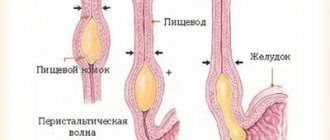The long 9 months of waiting are over and the painful process of giving birth to a baby has been completed. It would seem to grow and rejoice. But no! The child is worried, screams, pulls his legs up to his tummy, and you can hear that the baby’s belly is rumbling. It is clear that the little one does not sleep, sometimes does not eat and does not give life to everyone around him. Newly-made parents begin to get nervous and come up with all sorts of horrors, which worsens both their own condition and the baby’s peace of mind! What to do if your baby has a rumbling stomach? What to pay attention to and how to help your beloved child?
Grumbling belly - signs and symptoms
Rumbling in a baby's stomach often occurs after eating.
Only an inattentive or irresponsible parent will not notice this problem in a baby. As a rule, symptoms begin to develop after feeding and are audible to the naked ear. And if you put your hand to your belly, you can clearly feel that there is a real storm going on there. The following symptoms may be added to a rumbling tummy:
- Discomfort, abdominal pain
- Whims when feeding the baby - may take the breast, then immediately give up
- Sleep disturbance
- The baby presses his legs to his tummy
- Unmotivated cry
- Increased gas formation
- Liquid stool, sometimes with greenish impurities.
If such unpleasant symptoms are added to the rumbling in the stomach, then you need to contact your pediatrician, find out the cause and, possibly, undergo treatment.
Diagnostics
Identifying the causes of noise in the stomach begins with collecting anamnesis, palpation of the abdomen and examination of the oral cavity; a thorough examination is carried out to make an accurate diagnosis.
Diagnostic methods:
- clinical and biochemical blood test
; - bacterial culture of stool
; - coprogram
- allows you to identify parasite eggs, hidden blood in the stool, and determine the level of fat; - allergy tests
; - Ultrasound
– carried out to assess the parameters of the gastrointestinal tract, detect sand and stones; - CT
scan allows you to see manifestations of liver pathologies and malignant tumors; - X-ray of intestines
; - irrigoscopy
- x-rays with a contrast agent are performed to identify the causes of peristalsis disorders; - colonoscopy
- the inner surface of the colon is examined using an endoscope to identify polyps, ulcers, precancerous changes in tissues; during the examination, samples are taken for a biopsy; - sigmoidoscopy
– examination of the sigmoid and rectum.
If the diagnosis did not show obvious disturbances in the structure and functioning of the internal organs, rumbling in the stomach occurs without pain, then the problem is caused by mental and neurological pathologies, specialists prescribe an additional examination.
Important! Before bowel examinations, laxatives are often prescribed, which leads to increased rumbling sounds. Most often, unpleasant sensations occur after Fortrans.
Possible reasons
Doctors identify several causes of stomach grumbling in babies:
- Features of peristalsis in the intestines
- Changing your baby's diet
- Colic
- Lactose intolerance
- Microflora
Attention! Only a doctor, after examining the baby, can determine the cause of the unpleasant symptoms.
Peristalsis in a baby and first aid in this case
After feeding, the baby's digestive system begins to actively work. As a result, intestinal motility increases. This can cause a rumbling stomach and discomfort for your toddler. After feeding, you need to let the baby burp out excess air. Iron the diaper folded in several layers and place it on the baby's tummy. You can massage your tummy with stroking movements in a clockwise direction.
Changing your baby's diet - how to deal with rumbling
Changing your baby's diet can help with a rumbling stomach.
Analyze what the mother ate before feeding. Perhaps some apple or bun, having passed through the mother’s stomach and into the milk, is the culprit for the baby’s rumbling stomach. The same unpleasant reaction can be caused by medications that a woman takes. Therefore, you need to carefully read the instructions to see if this product is approved for a nursing mother.
If the baby is already being introduced to complementary foods, then this may be a reaction to a new product. Therefore, it is advisable to offer a new type of complementary food - juice, puree or porridge - to the baby in the first half of the day. This way you can observe the baby’s reaction to new food. It is better to endure rumbling, diarrhea and other unpleasant reactions during the day than to deal with them at night.
Colic - how to help your baby
During feeding, the toddler swallows some air. This causes bloating and rumbling in the stomach, pain, crying and suffering. This is the most common cause of baby suffering. After feeding, you need to hold the baby in an upright position and let him burp. This will reduce the amount of air in the baby's stomach. If colic begins, you can make a warm heating pad from a diaper. In this case, abdominal massage, lying on the stomach, and motor exercises—biking—help well.
Causes of flatulence in children
Intestinal flatulence in children occurs due to the accumulation of gases, the passage of which becomes difficult, accompanied by rumbling and pain. Why does bloating occur? Gases in a newborn are frequent companions of the most complex processes of adaptation of the body to life outside the womb.
Flatulence in an infant occurs when its intestines are full of foamy masses. This substance bursts the intestines from the inside, covers its walls and fills the intestinal lumen, preventing the absorption of food and disrupting the digestive process. All this causes pain and discomfort in the abdomen, which becomes hard and bloated. At the same time, the baby becomes restless and begins to jerk his legs sharply, trying to pull them closer to himself. Bloating in newborns can appear in the first month of life and continue to plague them for up to three to four months. The reasons may vary.
- Food that does not correspond to the age and maturity of the child’s gastrointestinal tract can cause flatulence - changes in formula, overfeeding, premature introduction of complementary foods, unbalanced nutrition;
- However, often the causes of bloating in newborns lie not in the food they eat, but in the fact that gases enter the intestines due to screaming, crying, improper feeding, in which air is swallowed along with milk or formula.
- Another important reason for bloating is the child’s overexcitement, restless behavior, or his unstable emotional state for some reason.
- It is worth keeping in mind that for a breastfed child, what his mother eats is very important, since the consumption of certain foods can cause flatulence in a 1-year-old child, not to mention newborns. Products such as fresh fruits, juices, legumes (peas, beans), white cabbage, walnuts, condensed milk, brown bread, kvass, and baked goods often cause flatulence in children.
- It has been noticed that premature babies suffer from flatulence more often, which is due to the immaturity of their digestive system, which has not yet finished forming: the stomach of a newborn is located slightly higher and more horizontally than in adults, the muscles of the walls of the stomach and intestines are less developed, which makes it difficult for food to move through.
- Flatulence in a newborn can also occur due to lactase deficiency, dysbiosis, or allergies to cow's milk proteins.
Review of popular drugs for a rumbling belly
Espumisan L is a drug for colic in children.
Sometimes home methods of dealing with unpleasant sounds and pain in the baby’s stomach do not help. The child is suffering, the parents are suffering. In this case, it is advisable to use special medications to improve digestion and eliminate colic. What is prescribed for colic in toddlers:
- Dill water
- Plantex
- Espumisan L
- Bobotik
The choice of remedy is the prerogative of the pediatrician. Self-medication in this case is inappropriate!
Dill water
This is a remedy that has been tested on thousands of generations of inhabitants of planet Earth. In the USSR, there was no other drug for children that relieved colic and rumbling. And nowadays, a decoction of dill seeds has not lost its relevance. It is best to purchase the drug at a pharmacy. Usually dill water is prepared directly in pharmacies, but you can also buy ready-made forms. Professional pharmacists are equipped with precise scales and other equipment.
Therefore, all the subtleties of preparing the decoction and aseptic conditions will be observed. The dosage is selected individually - from 3 to 6 teaspoons per day. A contraindication to the use of dill water is individual intolerance to fennel seed oil. Therefore, monitor the baby’s condition!
Side effects are cutaneous in nature - itching, urticaria, tissue hyperemia.
Plantex for colic
Plantex for colic - a remedy for colic.
The medicinal enzymatic preparation "Plantex" is essentially the same dill water, only in the form of granules and a well-promoted trade name. The main active ingredient is fennel oil. The drug is available in sachets.
The contents of the package are dissolved in water and used for their intended purpose. Children under one year of age are prescribed 1–2 sachets per day in several doses. Children from 1 year to 4 years – from 2 to 3 packets a day. Contraindications to taking the drug:
- Galactose or glucose malabsorption syndrome
- Lactase deficiency
- Galactosemia – metabolic disorder
- Individual intolerance to fennel oil
For babies, only a fresh solution is used without adding sugar or other sweeteners.
Espumisan L for colic
As the advertising slogan says, “if there is a hurricane in your stomach, take Espumisan.” This carminative is available in the form of a milky white emulsion. The main active ingredient simethicone reduces the density of gas membranes. Thanks to this, small bubbles collect into larger ones and are easily removed from the body. Babies under one year of age are prescribed 25 drops 3 times a day with meals. Children from 1 year to 6 years – 25 drops 3 to 5 times a day. No side effects were observed with Espumisan L. But there are a number of contraindications for use. Do not use a carminative for:
Parents' actions
In any case, a child crying loudly is a huge stress for parents. At the same time, they are often interested in how to help a baby with abdominal colic. The main thing is that there is no need to panic. It is enough to start performing simple techniques :
- If the baby is tormented by hunger, it is enough to feed him in order to relieve the rumbling in the stomach;
- After eating, you need to let the baby burp out excess air, and then the “nasty” colic will not bother the baby;
- Abdominal massage. Excellent in helping to cope with excess intestinal gases. It must be carried out very carefully, using a slight pressure on the nose, making all movements in the direction of the clock. They can tell and show in more detail the rules for performing massages in a children's clinic;
- Babies from three weeks of age, in case of colic accompanied by rumbling, are recommended to take special means that facilitate the elimination of gases and reduce their formation. The most popular: Dill water, Plantex, Kolikid, fennel tea, Espumisan and Bobotik.
- A good way to cope with excess intestinal gases is to lay the baby on the tummy on a diaper heated with an iron; this method is a natural massage and stimulates the intestines, and in addition, regular laying is an excellent prevention of colic;
- More often, grumbling is observed in babies fed with adapted artificial formulas, due to the fact that such babies swallow too much excess air in the case of an incorrectly selected nipple. To avoid this, it is necessary to have anatomically correct, age-appropriate, high-quality nipples;
- An infant should be calm before eating , because prolonged screaming before a meal also causes air to enter the stomach and contributes to the occurrence of colic and rumbling;
- Sometimes pediatricians recommend using a gas tube to get rid of excess intestinal gases. It must be remembered that this device must be used extremely carefully, due to the high risk of trauma to the rectum.
Before giving any drug to your baby, it is recommended to consult a pediatrician.
Preparations for normalizing intestinal microflora
Currently, TV screens encourage people to take medications to normalize the body's microflora. There are several dozen different names of such medicines. Doctors like to prescribe them, even when it is not required. As a matter of principle, it won’t hurt! The opinions of pediatricians were divided. Some prescribe medications like Linex and others for toddlers with colic, others are strongly against it.
This category of doctors believes that each person’s microflora is individual, and it is almost impossible to populate it with beneficial bacteria from the outside. In addition, the baby should develop its own unique set of useful and not so useful microorganisms. Therefore, do not rush to give your little one drugs with bifidobacteria and lactobacilli. Indications for taking such drugs can only be the results of an analysis for dysbiosis or bacterial content of the intestinal contents. So, dear adults, experiment on yourself! And it’s better to entrust the baby’s health to an experienced pediatrician!
Causes of rumbling in the stomach during and after feeding
- A nursing mother does not adhere to a diet. When breastfeeding a baby, especially in the first months, a woman should avoid fatty, sweet, salty and smoked foods, as well as foods that increase gas formation (legumes, cabbage).
- The mixture for feeding the baby is not selected correctly, or it is not prepared correctly - too liquid or, conversely, too thick.
- Dysbacteriosis. Due to the lack of beneficial bacteria, the baby’s intestines do not digest and absorb milk well, which can lead to bloating and constant colic.
- Muscle spasm. Due to slow digestion, food ferments and rots in the intestines.
- Lactose deficiency. If during each feeding your baby's tummy rumbles, it means he lacks the enzyme that helps break down lactose in the intestines. Then the mother's milk is not digested, and the fermentation process begins, which contributes to the appearance of rumbling and pain in the tummy. Signs of lactose deficiency may include green or yellow loose stools in a baby, as well as frequent cases when a baby, actively suckling at the breast, abruptly stops eating, draws up his legs and cries loudly, hysterically. But to confirm such a diagnosis, you need to consult a competent specialist - a pediatrician and undergo tests.
- A lot of air has accumulated in the child’s tummy, which interferes with the process of digestion and absorption of food. The mother needs to lay the baby on her tummy before each feeding, just for a few minutes, so that the air can escape. And after each feeding, gently hold him in a column so that he regurgitates excess food and air that entered the intestines while eating. Lying on the tummy also promotes the development of the muscles of the cervical and thoracic torso, relieves tension from them, and the child learns to independently lift and hold his head, turning it in different directions and exploring the world around him.
- If there was a long break between feedings, and then the baby began to suck greedily, with appetite, literally choking on breast milk, then this also contributes to loud rumbling in the intestines. If this happens too often, then it is better to avoid too long breaks - to wake the baby and feed.
- Before feeding, the baby screamed loudly and hysterically, swallowing excess air into the intestines. You just need to put him on his tummy so that he releases it along with a burp, and then begin the feeding process.
- The baby has eaten too much milk, and now its remains ferment in the tummy, causing bloating and strong rumbling.









